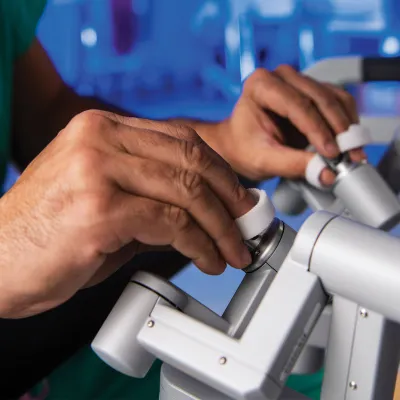
The Region’s Foremost Doctors Specializing in the Pancreas and Gallbladder
This page is primarily about treatment for benign pancreatic conditions. For information about malignant tumors in the pancreas, please see the page for pancreatic cancer.
There are several medical conditions that affect the pancreas, the gland behind the stomach that has both digestive and hormonal purposes. Gastroenterologists and surgeons at the AdventHealth Digestive Health Institute have a lot of experience in treating these pancreatic conditions, including pancreatitis, pancreatic cysts and pseudocysts, and exocrine pancreatic insufficiency.
Whole-Person Care for Pancreatitis
When the pancreas becomes inflamed, the result is pancreatitis. Pancreatitis can be:
- Chronic, a condition that lasts for years, or
- Acute, when symptoms suddenly appear and go away after a few days.
Chronic pancreatitis symptoms include:
- Pain in the upper abdomen
- Unintentional weight loss
- Stools that are oily and unusually smelly
Symptoms of acute pancreatitis include:
- Pain in the upper abdomen. This pain may worsen after eating and/or radiate to the back. Your abdomen may also feel tender when touched.
- Fever
- Increased pulse
- Nausea and vomiting
Pancreatitis can go away on its own, but cases with severe symptoms require medical treatment. See a doctor if you have abdominal pain that does not go away or if the pain is so severe that you are unable to find a comfortable position.
If left untreated, pancreatitis can cause a number of life-threatening complications. These can include infection, internal bleeding and breathing problems. Pancreatitis can also lead to conditions such as diabetes, kidney failure, and even pancreatic cancer.
It takes several tests for doctors to confirm a diagnosis of pancreatitis. These may include blood tests, a stool test (for chronic pancreatitis) and imaging tests to look for pancreatic inflammation and blockages in the pancreatic duct or bile ducts.
Treatment for acute pancreatitis involves hospitalization with the proper care to ensure the pancreas can heal itself and that a patient’s pain is well-managed.
For chronic pancreatitis, treatment is based on the cause of pancreatitis. Treatments include:
- Removal of the blockage in the pancreatic or bile duct
- Cholecystectomy (gallbladder removal) if pancreatitis was caused by gallstones
- Pancreatectomy (removal of some or all of the pancreas)
Pancreatic Cysts and Pancreatic Pseudocyst
Pancreatic cysts and pancreatic pseudocyst are most often discovered during an imaging test for another problem. A cyst is a self-contained sac that contains fluid. If a cyst only contains fluid, it is a simple cyst. If it has both fluid and solid parts, it is a complex cyst. The pancreas can also develop a pseudocyst, which is often caused by pancreatitis or heavy alcohol use. These masses look like cysts, but they are technically not cysts because they exist in cavities within the pancreas and are not self-contained.
Most pancreatic cysts are benign (not cancer). Some of them disappear on their own. Others require endoscopic treatment so they can be drained. Otherwise, the cyst might rupture, which could cause bleeding or infection. Finally, some types of pancreatic cysts are very likely to develop into cancer. If you have such a cyst, your doctor may recommend that it be removed. In this case, you would need a pancreatectomy. Living without part or even all of your pancreas is better than being at high risk for pancreatic cancer, which is very difficult to treat.
Exocrine Pancreatic Insufficiency
Sometimes chronic pancreatitis and even Crohn’s disease can lead to exocrine pancreatic insufficiency. This is a condition in which the pancreas fails to make all of the enzymes necessary for digestion that it should. The result is that the body is unable to absorb all of the nutrients it needs.
Patients with exocrine pancreatic insufficiency often experience:
- Weight loss
- Abdominal pain, and/or an abdomen that is tender to the touch
- Diarrhea
- Gas
- Smelly stools
Exocrine pancreatic insufficiency is treated with oral medications that replace the enzymes the pancreas is supposed to make. Patients will need to adopt a healthy diet, and some may need pain medications to better manage their abdominal pain.
Pancreatic, Biliary and Gallbladder Disease
-
Pancreatic Cancer
Our surgeons are among the region’s most experienced in pancreatic surgery. We can help treat your cancer with minimally invasive options. Learn more today.
-
Pancreatic Conditions
Gastroenterologists and surgeons at AdventHealth Digestive Health Institute are experts for treating Pancreatitis, Pancreatic Cyst and other conditions of the pancreas.
-
Pancreatic Surgery
AdventHealth Digestive Health Institute's pancreas surgeons offer minimally invasive pancreatectomy for Pancreatitis, Pancreatic Cysts and Pancreatic Cancer. Learn more.
-
Gallbladder Cancer
Removing the gallbladder with cancer is a very complex surgery that requires highly experienced surgeons like those at AdventHealth Digestive Health Institute.
-
Gallbladder Conditions
Advanced surgeons at AdventHealth Digestive Health Institute provide cholecystectomy and other treatments for gallbladder pain and gallstones.
-
Gallbladder Surgery
Surgeons at the AdventHealth Digestive Health Institute provide advanced, scar-less cholecystectomy for gallbladder pain and gallstones.
-
Bile Duct Diseases and Conditions
AdventHealth Digestive Health Institute gastroenterologists and gastrointestinal surgeons treat bile duct obstruction (blocked bile duct) and cholangiocarcinoma (bile duct cancer).
-
Endoscopy for Pancreatic, Bile Duct and Gallbladder Conditions
Gastroenterologists at AdventHealth Digestive Health Institute use ERCP and endoscopic ultrasound to diagnose and treat pancreas, gallbladder and bile duct diseases.

Recover Faster With Minimally Invasive and Robotic Surgery
The expert surgeons at the AdventHealth Digestive Health Institute have a large depth of experience in offering minimally invasive surgery.

Meet Your Dedicated Experts
Our specialists are passionate about providing collaborative care that addresses your unique needs and goals while ensuring you feel informed and supported every step of the way. Learn more about our team and their areas of expertise.

Surgical Consultations For Digestive Cancer Without the Wait
Appointments Within Seven Days for Patients with Cancer
At AdventHealth Digestive Health Institute, we know that after being diagnosed with cancer, patients want and often need to begin treatment quickly. So we make it a priority to offer appointments for cancer surgery consultations within five business days, and often earlier.
Patients who are newly diagnosed with cancer, or have just found out they have cancer again, qualify for this priority access. Our surgeons will make themselves available to see you right away, even for a second opinion. We want to help you start your treatment as soon as possible.
Let Us Help You Feel Whole Again
Whether you’re experiencing new symptoms or want a second opinion on a diagnosis, our dedicated digestive health experts are here to help you find answers and a path forward. Request an appointment today to take charge of your health and get the personal support you need.
